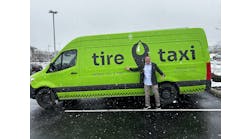It was widely believed that when the Republicans took control of the federal government in November that small businesses could breathe a sigh of relief. The reason is that traditionally, Republicans are “more friendly” toward business.
Lower taxes, less regulation, few new rules. However, we currently do not live in traditional times. Here is why: The federal government is terribly in debt, and they struggle with raising taxes on the general public, as that has largely been taboo toward getting re-elected. So without raising taxes, the government has little recourse. It’s time to go after businesses.
Sure, there will be few new rules. Previously, the threat of new overtime rules was on the horizon and believed to be a done deal, but the passage of the rule was put on ice. So why sound the alarm? Because the Department of Labor (DOL) has described the tire and automotive industry as “easy pickings” for violations. And a lot of junior auditors were just released throughout the country looking to become senior auditors. And the only way to become a senior auditor is to fine, fine, fine.
The industry is already being hit, with dealers across the country crying foul; over-zealous auditors are hitting hard and creating revenue for the government. It is not necessary for a complaint to be filed for an auditor to visit you, they just need to be in your neighborhood.
Let’s take a quick look at what is fact, what is fiction, and what you need to do to protect your business.
FICTION: Republicans are in charge, I’m good!
FACT: The government needs revenue and is actively enforcing current rules to maximize and generate funds.
FICTION: The new rules everyone talked about last year didn’t go into effect, I’m safe!
FACT: We need to clearly identify what was shelved and what is current. What was shelved was the increase in managerial base pay to $48,000.
Current rules, which are widely violated across many industries, are being heavily enforced. What are the current DOL rules regarding overtime and salary pay?
1) Only one salaried person can be in charge (with the ability to hire and fire personnel) per small location.
A very large tire shop can argue the need for two, but it’s likely to lose that argument. The salaried person must have autonomous ability; in other words, they must be able to make independent decisions. Many managers who work for an owner do not pass the basic test of hiring and firing. 2) Non-salaried employees must use a clock to record their hours, and be paid the proper overtime premium, and this includes overtime pay on bonuses and commissions. This is an area of frequent fines.
If an hourly person is paid a bonus, spiff or otherwise, they must be paid a “premium” on that money as per current federal regulations, every week. The table to make those calculations is available on the DOL’s website.
FICTION: My employees are happy, no one would turn me in.
FACT: If you want to roll the dice, that is your call. It is, after all, your business. Keep in mind, though, that an auditor, who happens to stop by and wants to snoop around, will pull your employees into an office one by one, and generally intimidate them into finding something. And then, if that junior auditor decides that your actions are “negligent,” he can then go back four years and calculate all lost wages, on top of fines. I wouldn’t roll those dice. See aforementioned “easy pickings” comment.
FICTION: I pay my employees well, I don’t have anything to worry about.
FACT: It’s not about how much you pay them (that was the rule that was frozen). It’s about how they are paid, and if the rules of managing and overtime are applied correctly. If you aren’t doing those two things correctly, be prepared for a stiff fine, penalties and payment of back wages.
I am sorry to be the bearer of bad news, but what I have read and heard from the industry, this is a real challenge. The good news is that it doesn’t take a whole lot to get in compliance.
First, make sure there is only one salaried employee per location who has the ability to hire and fire independently. Second, make sure that hourly employees clock in and out regularly, accurately, and are paid OT premiums on their bonuses and spiffs. Of course, this is a limited column, so I can’t get into minutia of details for hundreds of scenarios. This is meant as a general overview of the industry “as is.” If you believe that you may not be in compliance, I suggest talking to an expert (SESCO is the company my 20 Groups are referred to) and find out how to get there. ■
Dennis McCarron is executive director of Dealer Strategic Planning Inc., a company that manages multiple tire dealer 20 Groups in the U.S. (www.dsp-20group.com). To contact McCarron, email him at [email protected].
To read more Business Insight articles, click:
Digital Is Not Different -- It's Just a New Way of Doing an Old Thing: Selling
Mapping Out Your Road to Success

